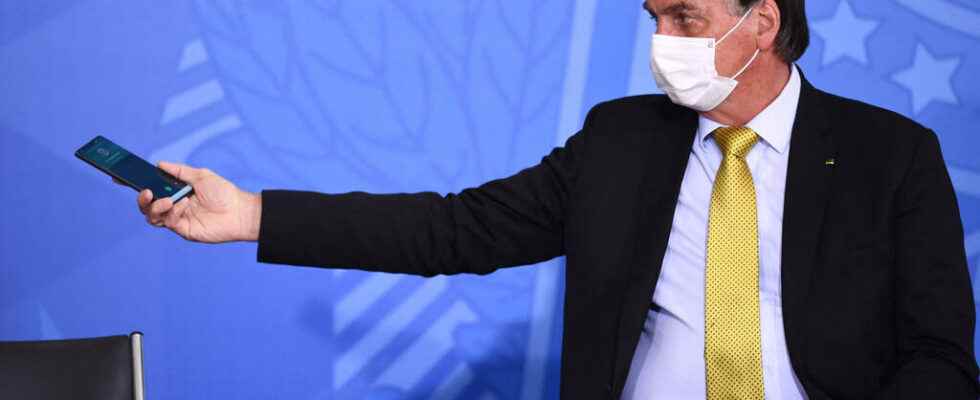The Brazilian Supreme Court judge, who had given Telegram 24 hours on Saturday to avoid being blocked, lifted this threat on the evening of March 20, saying that online messaging had complied with court orders. The application, platform favored by President Jair Bolsonaro and his supporters, is accused of not combating disinformation, a real scourge in the country a few months before the presidential election.
Considering that the requests of the Supreme Court of Brazil have been “ fully satisfied », « I revoke the decision to completely and completely suspend the operation of Telegram in Brazil “wrote Judge Alexandre de Moraes in a judgment made public by the Supreme Court.
The judge decided to block Friday March 18 the popular online messaging system, widely used by far-right President Jair Bolsonaro and his supporters, while the country is, seven months before the presidential election, plagued by misinformation.
This decision ” is inadmissible “, had then reacted President Bolsonarobelieving that the judge’s decision affected ” 70 million people “. ” What’s at stake is our freedom “, had declared the president, adding that the decision could “ cause death ” in Brazil ” due to a breakdown in communication between doctors and patients », according to the Brazilian edition of the BBC.
Telegram is downloaded on approximately 53% of mobiles in Brazil.
Messaging is considered by parliamentarians and members of the judiciary as one of the main nodes in the run-up to the presidential election, in particular because of the lack of moderation of message content. From bills currently being debated including possible restrictions in Brazil, are targeting this platform, according to the daily Folha de Sao Paulo.
The Bolsonarist camp has been regularly accused of disseminating false information, the president himself being the subject of an investigationaccused of having used digital militias during the 2018 election campaign.
Telegram gave pledges
On Saturday March 19, the judge had finally given 24 hours to Telegram to comply with the law, considering that the messaging had then ” partially complied with court orders “.
The 24-hour deadline was decided after Pavel Durov – the Russian founding boss of Dubai-headquartered Telegram – apologized to the Supreme Court, citing a ” communication problems “. He then asked for a new deadline to meet the requirements brazilian justice.
Despite Friday’s decision to suspend it, Telegram has never ceased to operate normally.
According to Judge Moraes, Telegram announced that it had taken several measures to combat misinformation. Among them, monitoring manual of the 100 most popular channels in Brazil, the ability to report posts deemed inaccurate, the restriction of profiles that spread misinformation and the promotion of verified information.
Removal of posts from Bolsonaro
According to the judge, the platform also suspended, at his request, profiles known for the dissemination of ” fake news “. She also appointed a legal representative in Brazil, as well as cut ties to a far-right support group for the president allowing access to ongoing criminal investigations, among other Supreme Court demands.
Telegram also told the court that the messaging system will set up a post reporting system “ imprecise “.
The judge also requested the deletion of a publication by Mr. Bolsonaro dating from last August and in which he questioned, without providing evidence, the reliability of the electronic voting system in Brazil, in place since 1996. The president regularly attacks this system.
Since Saturday already, this publication is no longer visible. ” This message cannot be displayed ” because ” it violates local laws “, it is indicated instead.
Encrypted online messaging is a keystone of Mr. Bolsonaro’s campaign strategy, which is aiming for presidential re-election in October and defending unlimited freedom of expression.
Unlike other platforms, on Telegram there is virtually no content moderation of messages and groups can gather up to 200,000 members, which greatly increases the viral potential of false information.
This has earned Telegram sanctions in some countries, ranging from the suspension – temporary or permanent – of its services to the targeted blocking of certain accounts or groups of users.
